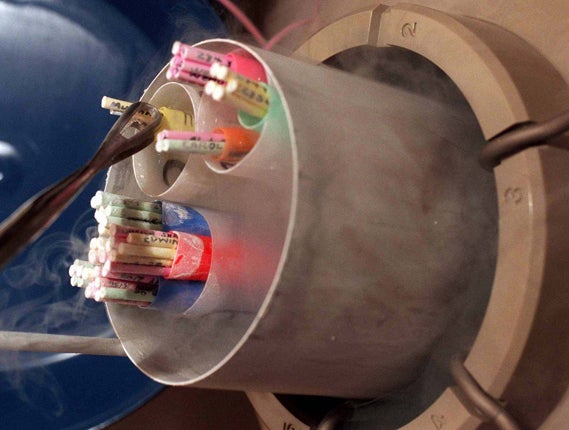'Scores of fertility clinics may risk patient safety'
After three embryos had to be destroyed, an investigation finds that mandatory witnessing procedures were not followed

The Government's fertility watchdog put patients at risk by failing to intervene in a London hospital at the heart of a series of embryo mix-ups earlier this year, a patient safety expert has claimed.
On the eve of a report into fertility treatment blunders at Guy's and St Thomas' hospital, Professor Brian Toft, a patient safety expert at Coventry University, said the Human Fertilisation and Embryology Authority (HFEA) had "failed" in its duties and warned that scores of other fertility clinics could also be taking risks.
The criticisms come just one week after an official review lambasted the watchdog for not using its "full range of sanctions" to clamp down on badly run fertility centres.
Professor Brian Toft, who conducted an official inquiry into a blunder in 2002 that saw black twins born to a white couple in Leeds, yesterday said the watchdog's failure to punish the hospital for those errors had increased the chance of similar mistakes at other clinics.
Embryos belonging to three couples had to be destroyed and their cycles of treatment jettisoned after the errors were uncovered at Guy's and St Thomas' hospital in February.
According to documents seen by The Independent on Sunday, an internal investigation at the hospital blamed failure to follow mandatory witnessing procedures and poor laboratory practices for the mistakes.
The HFEA, which regulates the UK's 117 IVF centres, has yet to take any sanctions against the hospital. A licence committee is expected to meet tomorrow to review an investigation into what went wrong, but it could be weeks before it publishes its findings.
"It beggars belief that people are not following mandatory procedures," said Professor Toft. "The HFEA should have acted immediately to put conditions on the licence to make sure [other clinics] understood it was a very serious matter and they would be held to account if any future incidents occurred... So much time has gone by now that there is no point putting any sanctions on [Guy's and St Thomas']."
He said the watchdog "should have sanctioned the hospital immediately... putting a very severe cap on the number of patients it was allowed to treat", or got rid of the head of the assisted conception unit, Yacoub Khalaf.
Professor Toft, who believes the HFEA is "not fit for purpose", asked the Government to investigate the watchdog's failure. But he said yesterday that his concerns had been brushed aside. "I was told Parliament couldn't do anything because the HFEA is an arm's length body," he said.
The hospital's investigation found that the embryo mix-ups were caused by staff allowing "two semen samples to be processed simultaneously". It said there had been "none [sic] adherence to all witnessing steps during processing". So-called "double witnessing" of every lab procedure, such as changing a Petri dish or placing an embryo in a freezer, was made mandatory on Professor Toft's advice after the Leeds error.
Previous HFEA inspections had found that the Guy's and St Thomas' unit had a history of failings on double witnessing and lab procedures, yet the regulator has never taken sanctions against the hospital.
One error at Guy's and St Thomas' came to light when the embryologist realised she had used a sample from the wrong man to fertilise a patient's eggs. Another was discovered when scientists testing for hereditary diseases found genes showing an embryo could not belong to the people believed to be its parents.
Subscribe to Independent Premium to bookmark this article
Want to bookmark your favourite articles and stories to read or reference later? Start your Independent Premium subscription today.

Join our commenting forum
Join thought-provoking conversations, follow other Independent readers and see their replies